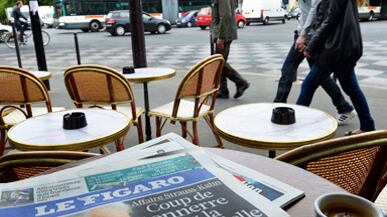Dominique Strauss-Kahn is the man many French citizens hoped would rid them of the despised President Nicolas Sarkozy. Paris-based writer Nina Sutton describes the despair of those DSK supporters—and their suspicions that he may have gotten caught in a honey trap. Plus, Bernard-Henri Lévy defends Strauss-Kahn, and the latest news updates on DSK.
Why did I wake up feeling so nauseated and dirty this morning? Why am I still so distraught at midday? Why do so many of my friends echo that feeling when calling on my American experience to try and make sense of the images that we sat watching over and over all evening yesterday? And why did those images seem so violent to us, when American cop shows have become our daily fodder on French television?

One answer is obvious. Yesterday, we saw the man we had placed all our hopes in to rid us of a president we loathe—not only for his politics but above all for his debasing of the highest office through his vulgar lifestyle, his greed for money, and his constant disdain for all things cultural—shackled and treated like a common criminal. We were about to entrust Dominique Strauss-Kahn with the future of our country, we saw him as the best qualified to tackle the economic crisis while showing concern for the plight of the poorest, and yet we heard prosecutor Artie McConnell describe him as a brutal and vicious sex maniac with no respect whatever for the woman paid to clean up after him.
And although some commentators pointed out that yesterday’s hearing was only about bail, stressing that the defense was not there to give DSK’s side of the story but only to ensure that there would be no Polanski-style flight from justice, the damage was done. The man, whatever happens next, will never be our president, nor is he likely to retain his chairmanship of the IMF. And many people around the world today must be wondering anxiously whether his successor can involve himself as intensely as DSK has to pull them out of bankruptcy.
But there is more to my discomfort. Three weeks ago, DSK was in Paris to prepare his candidacy for our 2012 presidential election. He met with several journalists, notably from the daily Libération. During a lunch interview, he frankly laid out what he saw as his main problems: “Money [the French don’t like a Socialist candidate to be rich], women, and my Jewishness,” he said, adding, “Yes, I love women, so what?” a sentence that, in the present circumstances, may sound cynical—but only if what he is accused of is true.
And, so far, I am not convinced, because the inconsistencies in the case are too numerous and because I haven’t yet heard his version of events. But what troubles me even more is that, in order to illustrate how closely his movements were being watched by the government and the kind of dirty tricks he feared as Sarkozy’s ratings kept dwindling while his own political star was at its zenith, DSK actually imagined that they could “pay a woman $500,000 or a million to accuse [me] of having raped her in a parking lot”! And, incidentally, there too, he left his cell phone behind.
“Money, women, and my Jewishness,” DSK said were his liabilities with French voters. “Yes, I love women, so what?”
So either last weekend's caper was a monstrous Freudian slip, because Strauss-Kahn really doesn’t want to be president and is afraid to tell his wife and his many supporters, or there is much more to that story than the damning complaint that was read yesterday in a New York criminal court. I am not a fan of conspiracy theories, but my first reaction when I heard the news was “I bet it was in a French hotel,” and it was. The Times Square Sofitel is known to be a favorite hangout for French diplomats and … spooks. It is also rumored to be easy on its customers’ mores.
A few other things sound suspicious. For example, that Twitter message in which a member of the UMP (Sarkozy’s party) announced DSK’s arrest only 15 minutes after it took place at Kennedy Airport, i.e., before it was officially on the wires. Or the violent anti-DSK diatribe of another Sarkozy supporter, Congressman Bernard Debré, in which he mentioned the accuser’s first name, Ophelia, at a time when the NYPD was busy shielding her identity.
I am not saying the crime did not take place; if it did, all my sympathy goes to the victim, and I thank God it was discovered before we elected DSK president. And I am not denying the fact that his womanizing, only too well known in Paris, is bothersome to many of us. But rape is a very different story, and the accused should be able to defend himself before he is convicted. Unfortunately, in this case it is too late. Should Strauss-Kahn finally manage to establish his innocence, even partly (more than a conspiracy, I suspect a honey trap), no verdict can give him back his credibility as a statesman after yesterday’s painful perp parade.
As a longtime defender of the American system of justice, I always liked to stress that, unlike what’s happening in France, rich and poor are treated the same in the States (at least when they are white). But I now realize how different the stakes are, and I wonder whether the French law forbidding TV channels to show a defendant in handcuffs before he has been tried is not a good thing.
Nina Sutton is an Anglo-French writer living in Paris. The author of a book on the Watergate affair, she covered American politics for some 30 years, notably as the Washington correspondent for Paris-Match and Libération.






